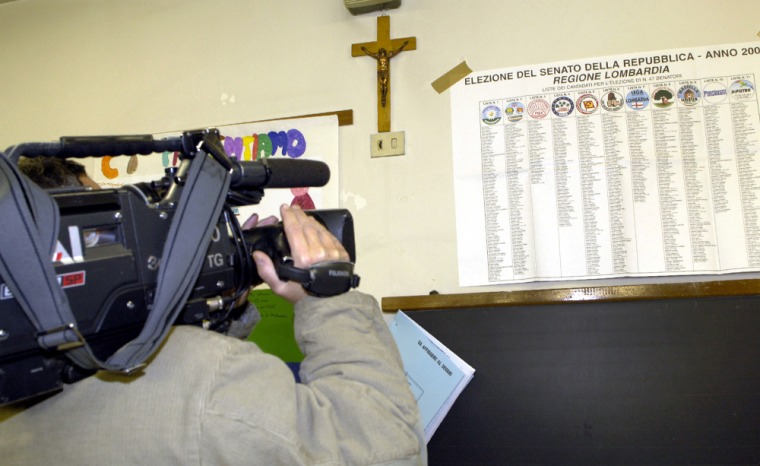The Vatican on Tuesday denounced a ruling by the European court of human rights that said the display of crucifixes in Italian public schools violates religious and education freedoms.
In a decision that could force a review of the use of religious symbols in government-run schools across Europe, the court ordered Italy to pay a $7,390 fine to a mother in northern Italy who fought for eight years to have crucifixes removed from her children's public school classrooms. The Italian government said it would appeal.
Vatican spokesman the Rev. Federico Lombardi said the crucifix was a fundamental sign of the importance of religious values in Italian history and culture and was a symbol of unity and welcoming for all of humanity — not one of exclusion.
He said a European court had no right intervening in such a profoundly Italian matter and said "it seems as if the court wanted to ignore the role of Christianity in forming Europe's identity, which was and remains essential."
"Religion gives a precious contribution to the formation and moral growth of people, and it's an essential component in our civilization," he said in a statement. "It's wrong and myopic to try to exclude it from education."
Crucifixes are common
Crucifixes are common in Italian public schools as well as courtrooms. Occasionally, legal cases arise; in one well-known case, a Muslim activist filed suit challenging the legality of the crucifixes in his son's elementary school in Ofena, about 90 miles east of Rome.
Though he eventually lost, the case was an early shot in what has become a battle in Europe about whether there should be any religious symbols at all in European classrooms and other public places. More recently in Italy, a judge who refused to hold hearings because there were crucifixes in his courtroom was ordered to stand trial for having failed to perform his official duties.
The Strasbourg-based court said the crucifix could be disturbing to non-Christian or atheist pupils, rejecting arguments by Italy's government that it was a national symbol of culture, history, identity, tolerance and secularism.
The court said secular, state-run schools must "observe confessional neutrality in the context of public education," where attendance is compulsory.
But while it fined the government, the seven-judge panel stopped short of ordering Italy to remove the crucifixes, which are common in Italian public schools. The ruling can still be appealed to the European Court of Human Rights' Grand Chamber of 17 judges, whose decisions are binding.
Mom files suit
The case was brought by Soile Lautsi, a mother of two who claimed public schools in her northern Italian town refused eight years ago to remove the Roman Catholic symbols from classrooms. She had maintained that the crucifix violates the secular principles the public schools are supposed to uphold, and the right to offer her children a secular education.
She filed her case with the European Court of Human Rights in July 2006, after Italy's Constitutional Court dismissed her complaint. Her efforts to rid public schools of religious symbols in a country that is predominantly Roman Catholic had not been welcomed.
Lautsi, who is of Finnish origins, and her husband, Massimo Albertin, said they were satisfied.
"We believe the ruling is a positive signal from Europe to Italy, which seems to increasingly lose its secularism," Albertin was quoted as saying by the ANSA news agency from his home in Albano Terme. "The crucifix creates discrimination."
Still, the government maintained the crucifix is a symbol of Italian and European history and tradition.
"In our country nobody wants to impose the Catholic religion, let alone with a crucifix," Education Minister Mariastella Gelmini said. But she added that "it is not by eliminating the traditions of individual countries that a united Europe is built."
'Disturbing for pupils'
In its ruling, the court said the presence of the crucifix "could easily be interpreted by pupils of all ages as a religious sign and they would feel that they were being educated in a school environment bearing the stamp of a given religion." It added that the presence of such symbols could be "disturbing for pupils who practiced other religions or were atheists."
Italian bishops said they were perplexed by the decision.
"The multiple significance of the crucifix, which is not just a religious symbol but a cultural sign, has been either ignored or overlooked," the Italian Bishop's Conference said in a statement.
